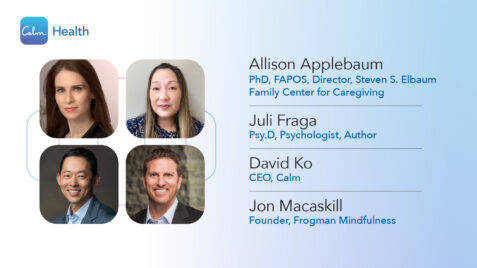Clinically reviewed by Chris Mosunic, PhD, RD, MBA, Chief Clinical Officer, Calm
TL;DR
- Gen Zers are overwhelmed by negative news and events, which leaves them emotionally drained and vulnerable to vicarious trauma.
- Gen Zers are engaged and feel responsible for shaping the future, but a lack of effective mental health support is undermining their potential.
- Health plans and employers can better support Gen Z with digital, evidence-based mental health support that meets them where they are—on their devices.
- Calm Health offers evidence-based programs and mindfulness content for ages 13+, including a program that supports people with vicarious trauma
A continuous stream of negative news and events can take a significant toll on the human psyche. From catastrophic flooding and scenes of injustice to protracted wars, gun violence, and the threat of AI, disturbing headlines and images can paint a soul-sapping picture of the world. Digital immersion now makes all of us susceptible to vicarious trauma, an experience traditionally tied to frontline work.
Indeed, a recent survey of 17,000 adults revealed that more than half (53%) are worried about an uncertain future, and nearly half (45%) feel that constant exposure to negative news is a major concern.
But those affected most by negative news are the young adults of Gen Z—an engaged, informed, and justice-minded generation that’s grown up on digital devices.
Amid a Gen Z mental health crisis, health plans and employers need to meet these young adults where they are, with digital, evidence-based support that’s as accessible and engaging as the news they’re consuming.
Gen Z wants to shape the future but feels overwhelmed
Gen Z cares deeply about the future and wants to help shape it, but engaging the way they do comes at a cost, new research shows.
According to a survey of more than 5,500 Gen Zers from seven countries,
- 53% of Gen Zers feel connected and engaged at a local, national, and global level;
- 58% feel a sense of responsibility toward their country; and
- 58% want to help shape the future of the world.
Engaged and responsibility-minded, Gen Zers consume news more than any other type of information, the survey found. Unfortunately, staying plugged in is leaving many of them feeling overwhelmed, with young adults and women Gen Zers struggling the most.
- 60% of Gen Zers feel overwhelmed by news or events, and 67% feel overwhelmed by news and events outside their own country.
- 67% of adult Gen Zers feel overwhelmed by news or events, while 54% of teen Gen Zers do.
- 64% of women Gen Zers and 56% of men Gen Zers feel overwhelmed.
Moreover, when Gen Zers feel overwhelmed, their sense of well-being can decline. And those whose well-being is eroded may feel less empowered, which means they’re less equipped to achieve their aspirations for the future.
Negative news increases the risk of vicarious trauma
Intuitively, we know that consuming negative news isn’t good for us. Unnerving headlines can trigger stress, anxiousness, or a visceral sense of discomfort, for example. It follows that absorbing negative news regularly can be a serious risk to our mental and physical well-being.
For instance, prolonged and persistent stress elevates one’s risk for increased anxiety and depression. It can also contribute to a wide range of physical conditions, such as digestive issues, headaches, muscle pain, heart disease, and stroke.
High levels of exposure to negative news can also increase the risk of vicarious trauma. For example, after watching images of a shooting, you might feel anxious or hypervigilant, as if you’re in constant danger. Videos of war zones or famine-stricken regions might leave you feeling exhausted, angry, or disconnected and unable to process the scale of human suffering. Or you might feel grief, rage, helplessness, or hopelessness upon seeing footage of police brutality. In fact, studies have shown that vicarious trauma can lead to the same mental and physical responses you’d have if you experienced an event directly.
With their heavy consumption of news, it’s not surprising that the majority of Gen Zers are feeling stressed: 75% are stressed about mass shootings; 58% are stressed about climate change; and 57% are stressed about immigrant families being separated or deported.
Barriers impede Gen Z’s utilization of traditional models of support
Supporting the mental well-being of Gen Zers requires a new approach. Although conventional therapy models are valuable, they often fall short at helping people due to a number of barriers, including high costs, limited provider availability, lack of understanding, and lingering stigma surrounding mental health support. For example,
- 43% of Gen Z believe that mental health stigma exists in the workplace,
- Only 52% of Gen Z feel knowledgeable about how and where to find mental health support, and
- 58% of Gen Zers and millennials say they’re not getting therapy because it’s too expensive.
In addition, as digital-first consumers, Gen Zers may experience emotional overload before recognizing their need for support. Rather than waiting to see a therapist they may not be able to afford, they need rapid access to alternative affordable solutions that can support them anywhere, anytime.
Employers and health plans have been called upon to act to support Gen Z
Employers and health plans are well positioned to deliver. In fact, the Global Coalition for Youth Mental Health, citing the positive influence of private employers on youth mental health, has called upon employers and health plans to take action to protect and improve the mental health of Gen Z:
“Evidence-based solutions exist and are ready to scale. Your leadership can drive innovation,
shift mindsets, and break the silence around mental health—while also enhancing your workforce,
communities, and brand purpose.“
Of course, news-related trauma isn’t an isolated experience; Gen Zers and employees of all generations are also experiencing workplace stress and burnout. In fact, 66% of American employees are experiencing some level of burnout in 2025, with 81% of adult Gen Zers reporting burnout.
Investing in scalable, evidence-based mental health solutions is a strategic imperative for organizations seeking to improve employee well-being and productivity and retain critical talent.
Calm Health provides digital, evidence-based mental health support for employees and members ages 13 and up
A digital mental health support app, Calm Health addresses barriers head on, driving member and employee engagement with psychologist-developed, evidence-based programs. For example, Calm Health
- Is accessible via smartphones and laptops, meeting Gen Zers where they are;
- Can be used privately, without stigma attached;
- Uses tools and techniques based on the approaches of evidence-based therapy models, such as cognitive behavioral therapy (CBT), dialectical behavior therapy, and acceptance and commitment therapy;
- Personalizes support based on an individual’s mental health screening results, as well as their health conditions and personal goals; and
- Guides users to the mental health resources most appropriate for their needs, such as an employee assistance program, crisis line, or other mental health benefits
Uniquely, Calm Health supports people in addressing the challenges associated with specific health conditions, occupations, and life experiences, including vicarious trauma associated with consuming negative news.
Calm Health offers evidence-based program for vicarious trauma
Developed by licensed clinical psychologist Dr. SH Moon, Processing Vicarious Trauma from World Events is an evidence-based program that provides insights and tips about vicarious trauma to support listeners in finding more balance and groundedness in their world.
For example, listeners learn about the effects of mental filtering—paying attention only to bad news and filtering out the positive. They also learn about overgeneralization—making broad assumptions based on one negative event. More importantly, listeners learn how to reframe their thoughts using a more grounded perspective.
The following are the episodes in the program:
- “What Is Vicarious Trauma?”
- “Grounding Your Thoughts”
- “Finding Hope When Feeling Hopeless”
- “Mind Your Social Media Consumption”
- “Getting Focused on Your Values”
- “Mindfulness to Support Vicarious Trauma”
Calm Health also features Build Healthier Phone Habits, a program by Aditi Nerurkar, MD, MPH, to help people establish a more balanced relationship with their phone and support their mental health as they navigate the digital world.
Gen Zers are aware that digital consumption can be harmful
More than half of young adults say their extensive use of social media and digital devices negatively affects their mental health. Now’s the time for employers and health plans to capitalize on that awareness and support them with evidence-based programs that they can access in the palm of their hand.
From these blog posts, learn more about how Calm Health supports Gen Zers and their parents:
- Supporting the Mental Health of Teens Starts with Supporting Parents
- College Students Are Struggling. Digital Mental Health Can Help.
- Parents of Teens Want More Support in the Workplace
- Understanding and Supporting Teen Mental Health
- How Employers Can Help Improve the Mental Well-being of Gen Z Workers




